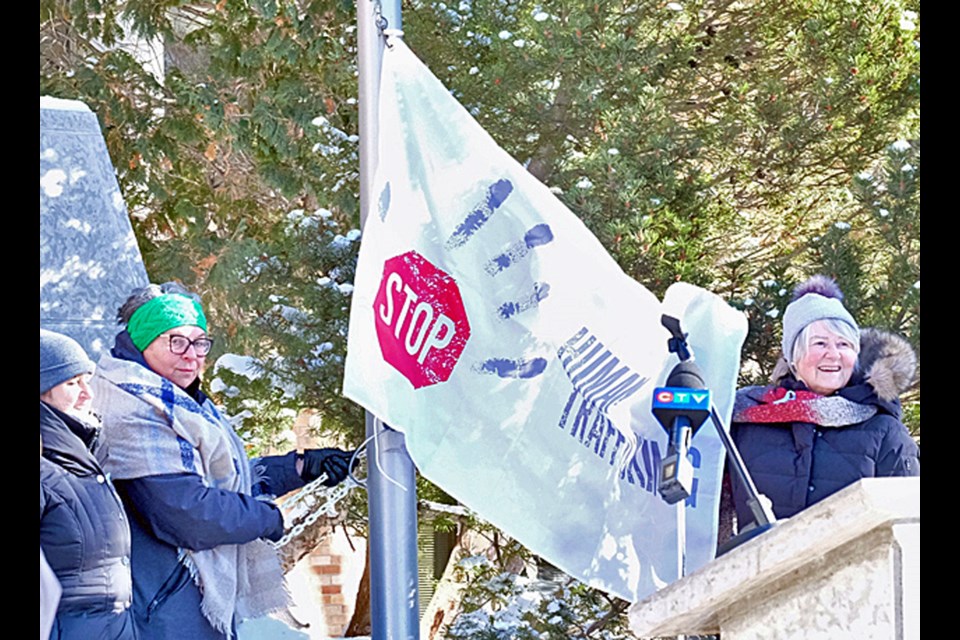SASKATOON — The St. Anne Council of the Catholic Women’s League of Canada held a flag-raising ceremony last week to increase awareness about the issue of human trafficking. The city council declared Feb. 22 Human Trafficking Awareness Day.
More than 50 people, led by St. Anne CWL’s Human Trafficking Awareness Project co-chairs Anne Ashcroft and Donna Aldous, braved the freezing conditions to get out their message of having human trafficking victims someday returning to freedom.
“We believe that awareness of this terrible crime will lead to action. We hope that this action will stop human trafficking, or at least improve the lives of people affected by this horrible crime,” said Ashcroft on Catholic Saskatoon News.
“The blue ribbon represents the sadness of those trafficked while reminding us of the cold-heartedness of those who buy and sell human beings. Even here in Saskatoon, we have young women and girls, young men and boys who are at risk of being trafficked.”
“As a concerned mother and grandmother, I recognized that action needs to be taken sooner rather than later. Awareness is the first step,” she added.
Aldous called on everyone to act now and help spread awareness on the issue of human trafficking and the horrors it brings to the victims.
“Knowing about this will create passion and the will to do something about it; we have to, we have to,” said Aldous.
Roman Catholic Diocese of Saskatoon Bishop Most Rev. Mark Hagemoen thanked the CWL members and other groups — Christian and not-for-profit community organizations — that tirelessly raise awareness and help all victims.
“These are difficult issues and we must confront them,” said Hagemoen, who prayed to the victims and survivors of human trafficking and all modern forms of slavery.
Hope Restored-Canada Saskatoon house program coordinator Ashley Peter said their eight-bed safe house help victims and survivors of sexual exploitation and human trafficking. She added that Indigenous women had been victims of these abuses.
“I am a Cree Métis woman from Northern Saskatchewan and from the time I was conceived, from the time my daughters and nieces were conceived, we had a statistic placed on our heads,” said Peter.
“As an Indigenous woman, I know my sisters make up four per cent of Canada’s population and we are 20 times more likely to be murdered and to go missing. We are 40 times more likely to experience intimate partner violence and 10 times more likely to commit suicide than any other race in Canada.”
She emphasized that human trafficking and sexual exploitation are not only Indigenous issues but also a people issue in Saskatoon. She added that an estimated $350,000 is the annual profit from a single human trafficked person.
Peter added that Hope Restored aims to support and transform the lives of individuals and youth in the province who are victims of sexual exploitation and human trafficking.
“We are also passionate about providing awareness and education to the community. As an agency, we see first-hand the devastation this issue causes in people’s lives,” said Peter.
Saskatoon Police Service Deputy Chief Mitch Yuzdepski said Saskatchewan had the fifth-highest rate of human trafficking in the country in 2020, with 93 per cent of the victims being Canadians.
“For many people, this is a global problem. It is, but it is also a local and Canadian problem. We know that there are many victims in this thriving industry, many survivors,” said Yuzdepski.


